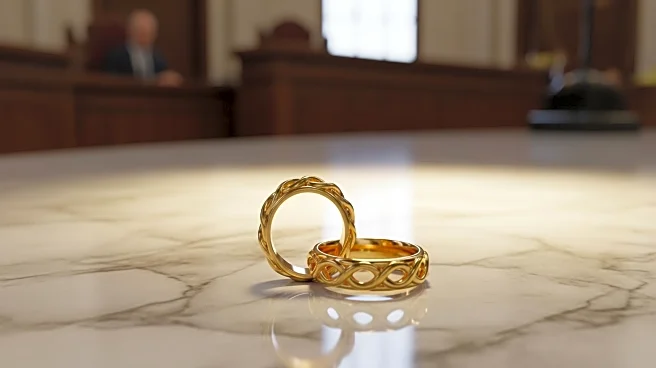What's Happening?
The U.S. Supreme Court is set to consider a longshot appeal from Kim Davis, a former Kentucky court clerk, who is challenging the landmark 2015 Obergefell v. Hodges decision that legalized same-sex marriage nationwide. Davis, who refused to issue marriage licenses
to same-sex couples, is seeking to overturn a lower court order requiring her to pay $360,000 in damages and attorney fees. The appeal will be discussed during the court's private conference, where justices vote on which cases to accept for argument. Justice Clarence Thomas has expressed support for erasing the same-sex marriage ruling, while Justice Amy Coney Barrett has indicated that some decisions should be reconsidered, though she has suggested same-sex marriage might be different due to societal reliance on the ruling.
Why It's Important?
The potential reconsideration of the Obergefell v. Hodges decision could have significant implications for civil rights in the United States. Overturning the ruling would affect the legal status of same-sex marriages, impacting thousands of couples who have relied on the decision for legal recognition and benefits. It could also signal a shift in the Supreme Court's approach to precedent, following recent decisions that have overturned established rulings, such as the constitutional right to abortion. The case highlights ongoing debates about the balance between religious beliefs and civil rights, with potential consequences for LGBTQ+ rights and broader societal norms.
What's Next?
The Supreme Court's decision on whether to hear the case could be announced as early as Monday. If the court decides to take up the appeal, it would set the stage for a significant legal battle over the future of same-sex marriage rights in the United States. Stakeholders, including LGBTQ+ advocacy groups, religious organizations, and legal experts, are likely to mobilize in response to the court's decision. The outcome could influence public opinion and legislative actions at both state and federal levels, potentially leading to new legal challenges and policy debates.
Beyond the Headlines
The case raises ethical and cultural questions about the role of the judiciary in shaping social policy and the extent to which personal beliefs should influence legal decisions. It also underscores the ongoing tension between progressive and conservative values in American society, with potential long-term effects on the country's legal landscape and cultural norms.















